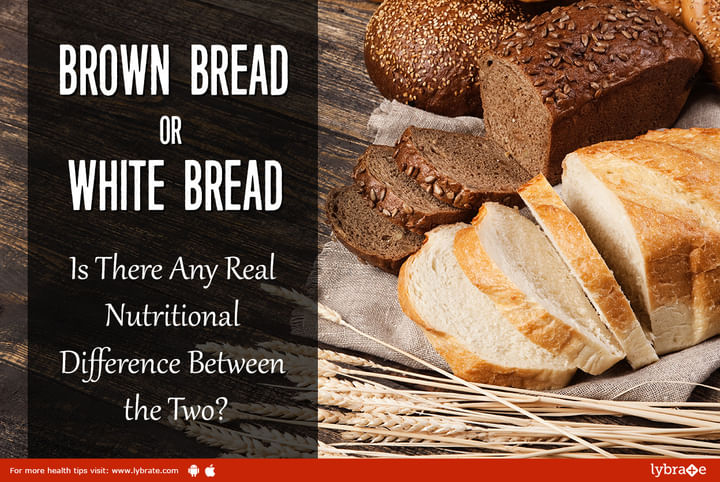Get the App
For Doctors
Login/Sign-up
Last Updated: Aug 29, 2019
BookMark
Report
Brown Bread or White Bread - Is There Any Real Nutritional Difference Between the Two?
Brown bread or white bread- Which of the two wins the age-old nutrition war?
Bread is a very versatile food variant and finds its place on most breakfast platters. Be it white, brown or whole grain, mass produced quality or home-baked artisan kind, bread is almost indispensable in modern Indian household. There has been incessant debate over which carries the most health benefits and nutritional value, read on to explore…
Why brown or whole wheat bread is good for you?
1. Whole wheat grain
Flour is prepared from wheat berries made out of the bran, the germ and the endosperm they in combination are filled with nutrients. Whole grain or wheat bread intake decreases LDL, or the bad cholesterol, it also helps you retain a healthy body weight due to low carbohydrate content and has a lower glycaemic index that keeps your blood sugar steady.
2. Smooth bowel movements
The fibrous quality provides you relief from irritable bowel syndrome. The bran and germ improves your bowel by increasing the bulk of stools, making it easier to pass through the intestines. If you are prescribed laxative medications all you need to do is have enough brown or wheat bread.
3. Nutrients and vitamins
Breads labelled whole grain contain a large amount of nutrients. One of the most important features of brown bread is that it contains most of B vitamins -including riboflavin, thiamine and niacin -- that helps your body acquire energy from food. Whole wheat breads are also rich in vitamins E, K, pantothenic acid and folate.
Tip – With only a slight difference in taste and texture, wheat bread adds as a great accompaniment with any dish. You can even double it up as a healthy sandwich by adding fresh veggies and cottage cheese, with only minimal preparation.
Why white bread is bad for you?
1. Low fibre content
White bread is low in fibre, an essential in lowering your levels of bad cholesterol and checks the smooth functioning of your gastrointestinal tract. An average slice of white bread consists only 0.5 grams of fibre with the whole wheat bread providing up to 2 grams of fibre.
2. Refined grains
The whole grain is stripped of all its bran and germ for it to be refined where it loses all elements that hold fibre, magnesium, zinc, vitamins and minerals. White bread is made from these refined grains. Even though bread-makers attempt to add some vitamins back in, fibrous whole grains prove to be the clear winner.
3. High glycemic index
This index measures how rapidly food affects your blood sugar and insulin levels compared to pure glucose. White bread has a high glycaemic index due to which it gets rapidly absorbed during digestion, causing sharp spikes in blood sugar and insulin levels. A diet comprising of high-glycaemic foods increases your chances of weight gain, type-2 diabetes and heart problems.
Replace the white bread with the equally tasty, wheat-made variant to score high on the fitness meter!
If you would like to consult with me privately, please click on 'Consult'.
Bread is a very versatile food variant and finds its place on most breakfast platters. Be it white, brown or whole grain, mass produced quality or home-baked artisan kind, bread is almost indispensable in modern Indian household. There has been incessant debate over which carries the most health benefits and nutritional value, read on to explore…
Why brown or whole wheat bread is good for you?
1. Whole wheat grain
Flour is prepared from wheat berries made out of the bran, the germ and the endosperm they in combination are filled with nutrients. Whole grain or wheat bread intake decreases LDL, or the bad cholesterol, it also helps you retain a healthy body weight due to low carbohydrate content and has a lower glycaemic index that keeps your blood sugar steady.
2. Smooth bowel movements
The fibrous quality provides you relief from irritable bowel syndrome. The bran and germ improves your bowel by increasing the bulk of stools, making it easier to pass through the intestines. If you are prescribed laxative medications all you need to do is have enough brown or wheat bread.
3. Nutrients and vitamins
Breads labelled whole grain contain a large amount of nutrients. One of the most important features of brown bread is that it contains most of B vitamins -including riboflavin, thiamine and niacin -- that helps your body acquire energy from food. Whole wheat breads are also rich in vitamins E, K, pantothenic acid and folate.
Tip – With only a slight difference in taste and texture, wheat bread adds as a great accompaniment with any dish. You can even double it up as a healthy sandwich by adding fresh veggies and cottage cheese, with only minimal preparation.
Why white bread is bad for you?
1. Low fibre content
White bread is low in fibre, an essential in lowering your levels of bad cholesterol and checks the smooth functioning of your gastrointestinal tract. An average slice of white bread consists only 0.5 grams of fibre with the whole wheat bread providing up to 2 grams of fibre.
2. Refined grains
The whole grain is stripped of all its bran and germ for it to be refined where it loses all elements that hold fibre, magnesium, zinc, vitamins and minerals. White bread is made from these refined grains. Even though bread-makers attempt to add some vitamins back in, fibrous whole grains prove to be the clear winner.
3. High glycemic index
This index measures how rapidly food affects your blood sugar and insulin levels compared to pure glucose. White bread has a high glycaemic index due to which it gets rapidly absorbed during digestion, causing sharp spikes in blood sugar and insulin levels. A diet comprising of high-glycaemic foods increases your chances of weight gain, type-2 diabetes and heart problems.
Replace the white bread with the equally tasty, wheat-made variant to score high on the fitness meter!
If you would like to consult with me privately, please click on 'Consult'.



+1.svg)
